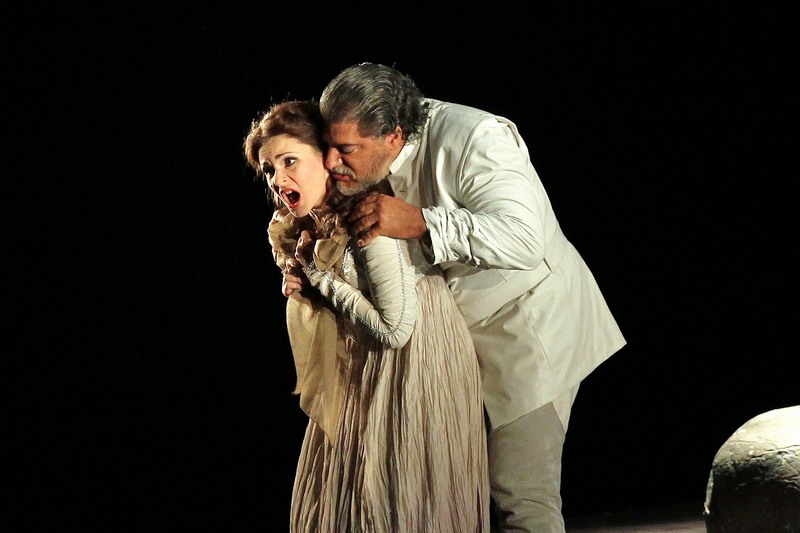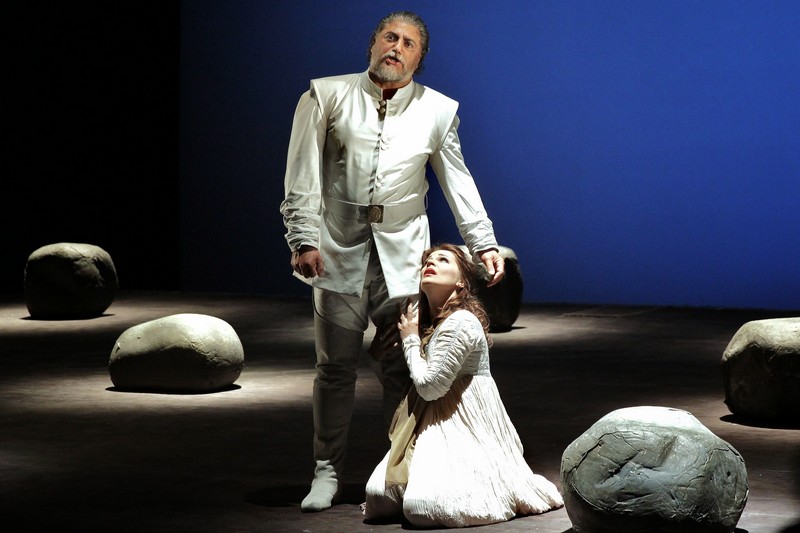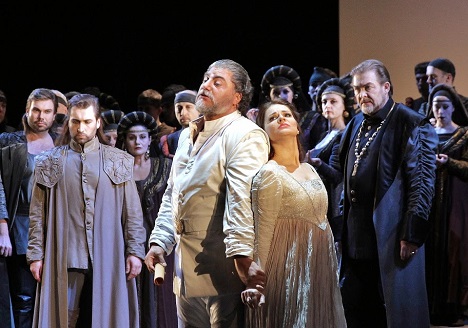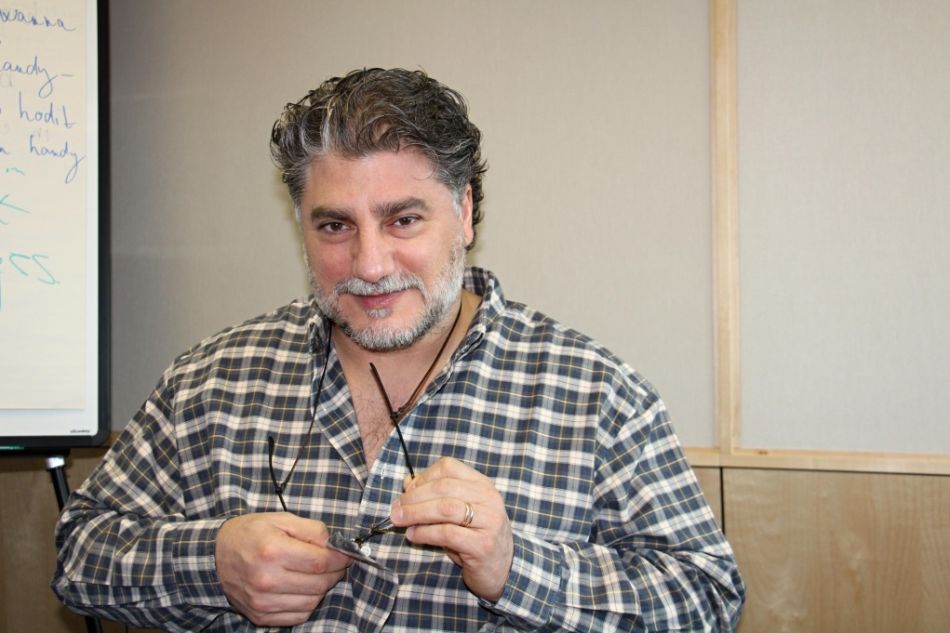

Bravo Cura
Celebrating José Cura--Singer, Conductor, Director
Operas: Otello in Prague
January & February 2015
Otello in Prague
Cast
Giuseppe Verdi:
Otello
Conductor:
Martin Leginus
Director:
Dominik Neuner
Set:
Vladimír Nývlt
Costumes:
Josef Jelínek
Otello – José Cura
Desdemona – Eva Hornyáková
Jago – Richard Haan
Cassio – Richard Samek
Emilia – Jana Horáková Levicová
Roderigo – Václav Sibera
Lodovico – Oleg Korotkov
Montano – Ivo Hrachovec
Herold – Libor Novák
Reviews
Attempt at Worldliness
Harmonie
Lubos Stehlik
The year-long project of Czech Radio Vltavais is to pull together the heroes of poetry, literature, resistance of Czech and international cultural and social history; pride of place are heroes and antiheroes in the world of opera. These certainly include Shakespeare’s Othello and its simplified shadow as written by Giuseppe Verdi and Arrigo Boito. On Thursday, January 29, 2015, the National Theatre presented on the stage of the Prague State Opera the Argentine tenor (also a conductor, director, composer, photographer, painter and entrepreneur) José Cura in the title role of Verdi’s Otello, the deranged jealous hero who quickly changes into a pathetic villain. It was an interesting attempt at worldliness, hosting a famous artist not at an opera gala as we are used to seeing in Prague but in repertory performances.
José Cura, aging in years and graying, has multiple demands and activities. His acting and stage deportment is mature and intelligent and he is certainly one of the most interesting (media-attractive) opera stars. But if the theater wants to gain international stature it should be deploying the best available [singers] to partner the star.
I will not write about director Dominik Neuner because intellectually he was close to impotent and that is regrettable. What surprised me, on the contrary, was that the State Opera Orchestra and the singers of the State Opera Choir were not accurate in intonation which did no honor to Mr. Verdi. Deliciously pure chords were scarce. It should be added that a share of the responsibility belongs to conductor Martin Leginus.
Who were Cura’s teammates? They were dominated by the young tenor Richard Samek. His healthy, clear voice was a joy to listen to and was perfect for the role of Cassio. Others were only sparring partners. Richard Haan was the manifestation in voice and expression of a dull caricature of the insidious and evil symbolized by Iago and the undoubtedly talented Eva Hornyáková so far has neither vocal nor [stage] experience and although she belongs to the younger generation of singers, her high notes sounded forced, as if she were twenty years older. When interpreting the the singing of 'O Salce!' and 'Ave Maria' I could only keep my fingers crossed that it would go well, at least. Naturally, I did not expect to hear a performance like Tebaldi, Te Kanawa, Fleming, Freni, Cappuccilli, D’Arcangelo…but still the Opera should have been able to find better.
What about José Cura? At the beginning I was startled by the vocal instability and the force in the intense dynamics in the higher register, which had to climb over the over-exposed Orchestra. Uncertainty due to movement on the stage is a natural condition but some of the uncertain notes were certainly unnecessary. Fortunately, he calmed down, he sang ecstatically and especially in the last act was suggestive. Otello, however, like no other Verdi character, is a complex role and Cura’s acting, which dominated the evening, was so extraordinary and unprecedented in my experience that I forgive him everything.
Certainly it is a good thing that the National Theatre (with the help of the Bohemian Heritage Fund) invited José Cura but the hosts should be better prepared and consider whom to invite. I wish the National Theater to cast the second Otello on 24 February differently so that José Cura can introduce fans to his mature art at the highest level.
|
|
José Cura at the State Opera: Otello without Compromise
OperaPlus
Robert Rytina
30 January 2015
[Excerpts / Gist]
Ever since the media reported that José Cura would perform the lead role in Verdi’s Otello at the Prague State Opera, the upcoming event engendered two views. The first was sincere enthusiasm that the tenor, who is among the world’s top stage performers, was finally in our capital city. The second was a certain level of malice. Cura has recently appeared on various occasions in Olomouc, Czech Budejovice, and two series of performances of Pagliacci at the turntable stage in Czech Krumlov. Like an old friend Cura had even been involved directly with the State Opera: ten years ago he joined the ensemble to tour Japan with Verdi’s Aida, working with members of the orchestra and choir in a rather intense experience. Idea number two, then, about Prague hosting the singer was almost conventional. José Cura was not just an ornament at the Vienna Staatsoper, the Met or Covent Garden, but also at theaters in Linz, Karlsruhe, Warsaw and Bratislava, so as far as our city is concerned—it’s about time.
So how big was the celebration in Prague (where Cura had previously sang and conducted in 2002 and 2003 in the Municipal House) for this current Verdi engagement? If I may say so, it was definitely exceptional. José Cura presents himself as a solitary figure among the singing elite—he is not dependent on influential management or record companies. This fact gives him complete freedom in his artistic plans. As a passionate singer, conductor, director and photographer in one person he can undoubtedly choose from a menu of offerings from around the world. And as you can see, it seems the attraction of interesting items on the menu draws him more than the reputation of the place from which it comes. Certainly, the ‘solitaire’ Cura is now probably more of an achievable celebrity than those represented by top agencies, but still his presence remains an event.
This singer’s willingness to portray Otello at the State Opera is particularly worthy of special attention. Honestly, since Placido Domingo only José Cura has claimed global ownership of this pivotal Verdi role. He caused a sensation in his debut in the role in Turin in 1997—with Barbara Frittoli and Ruggeri Raimondi at his side and the Berlin Philharmonic under Claudio Abbado in the lead. In subsequent Otello performances Cura has won the acclaim from many stage that accompanies him to this day. Try to answer this yourself: who among the current tenor stars can aspire to remove the Argentine from his throne as the Lion of Venice? With all due respect to Aleksandrs Antonenko or Johan Botha, I am afraid we will have to wait for some time for another Otello.
Personally, I had the opportunity to see and hear Cura as Otello in a staging at the Vienna State Opera in 2001. The tenor had a very youthful appears and portrayed the jealous Moor from the outset as quite neurotic, suspicious and almost paranoid. Visually and thanks to the characteristic tension in his voice he clearly represented a sort of volcano before an explosion. Iago (Renato Bruson) seemed to have enjoyed the possibilities of how easy it was to provoke the nervous monster, and then only to chuckle as he took in the effects and consequences of his experiment.
With the passage of fourteen years from that experience, I was wondering in what further directions the singer had developed the role. In numerous interviews Cura himself makes no secret of his conviction that only now as a man in fifties does he feel completely authentic in the role of Otello as a mature man. What experience awaited the audience in the completely filled auditorium at the Prague State Opera on Thursday, January 29?
Cura entered the minimalist production as a formidable figure in a bright white uniform, but one with graying hair and a big mustache. It was clear that Cura sees his commander as an experienced man in the prime of life, longing to be a mentor for those around him and one with natural authority. He dealt with the drunken fight between Cassius and Montano with the objectivity of a teacher who has caught his students fighting: an immediate punishment and admonition ended the entire affair for him, and its relation to future events was tragically missed. Extremely interesting was where Cura took Otello’s relationship with Desdemona. It seemed this husband loved his wife but felt—given the considerable age difference—a kind of paternal guardianship as well. The duet at the end of the first act effectively managed the right compromise between these two positions with Desdemona falling asleep and Otello acting more like a caring parent who guards his daughter’s sleep.
In the second act was the moment that I personally perceived as one of the highlights of the show. During the quartet—Otello, Desdemona, Iago, and Emilia—Cura changed from the sober Otello with nagging doubt about the fidelity of his wife. This drastic transformation in personality portrayed by the singer was absolutely masterful. Tension and anger was then replaced with negotiation, a sort of passiveness. There was a somewhat weakened musical duet with Iago but conceptually in this role he worked to contrast euphoria with the subsequent apathy naturally.
At the beginning of the third act Otello is found alone in a royal pose in the foreground of an empty stage; it is obvious that Iago has supplied evidence to fully confirm his darkest fears. In the scene with Desdemona, his undefined relationship with her turned almost schizophrenic—Otello erupted in an outburst of jealousy, which sharply replaced his attempt to treat his wife from the position of an educator. In this role, however, the Moor failed and after symbolically throwing his wife to the ground he collapsed himself on the stage in tears. Rather than crying over the dire situation, he was instead in grief over his inability to deal with it. For the monologue “Dio! Mi potevi scagliar” Cura sang mostly lying down and in a painful state. Before the end, however, he was already on his feet again and his Otello comes to the scene with the envoy Lodovico with almost frantic ecstasy, during which the Warlord’s fury, bordering on symptoms of mental illness, horrified the public.
Whoever expected to see Cura as a crazy monster without control in the fourth act of Otello had a surprise. The dialog before strangling Desdemona was presented by the interpreter with a kind of cool objectivity, with folded hands: Otello had already settled on his wife’s murder. The subsequent allegations and clarification by Emily and Cassio of Iago’s intrigues caused Otello’s entire world to collapse. Before his suicide he realized who he actually wanted to be: an example of wisdom and life experiences to those around him. The events of recent days, however, convinced him of his utter failure: Otello doesn’t die as a noble hero but as a sobbing wreck.
It remains to be added that his portrait of the Moor of Venice rested also on Cura’s respectable voice and speech. The initial entry of "Esultate” was difficult…he gave the impression that as a singer he might be having a little trouble with a natural full treble, but the concerns quickly dissipated. By the end of the first act, his voice sounded very balanced in all positions. Despite his excellent natural vocal performance his is not exactly an example of absolute obedience to the style and the score, though Cura can still persuade listeners with a voice that is always directly proportional to the performance of a particular role. The tenor feel for language and his ability to work effectively with the slightest phrase is an approach I find fully justified.
[…]
During the enthusiastic standing ovation after the performance José Cura engaged in a series of slapstick traditions. First he bowed to the prompter’s box, inhabited by Mrs. Catherine Sováková, shook her hand and then handed her flowers. When he was caught during one of the other curtain openings with his back to the audience, he turned, stood at attention and saluted. Certainly he will long be remembered for his elegant [action with the flowers] which Cura unexpected threw to the women’s chorus.
So much for the forty-first reprise of Verdi’s Otello at the Prague State Opera. The forty-second (already sold out) will be held February 24 with virtually the same cast, with only Pavla Vykopalová replacing Eva Hornyáková in the role of Desdemona.
|
|
|
|
|
 |
Eye-Witness Reviews
|
|
|
|
|
|
Tenor José Cura will perform for the first time at the Prague State Opera, performing as Otello
Český rozhlas
29 January 2015
One of the most sought-after contemporary tenor will perform for the first time today on the Czech opera stage. Argentine José Cura will appear at the Prague State Opera in the title role of Giuseppe Verdi’s Otello. It is a role for which José Cura has gained worldwide fame: in the last few seasons he has appeared as Otello in Vienna, Berlin, and New York.
According to the experts, Argentinean tenor José Cura has the resonant voice and unusually drama delivery that makes him a desirable representative of Otello on the most prestigious stages of the world
He has been singing the title role in the Verdi opera for more than twenty years; however, only at the age of fifty could he begin to understand it.
“I would say that my Otello is only beginning to emerge. Twenty years ago, I knocked on his door. Finally he has opened that door and let me in. And I am slowly getting into his head, penetrating into the finest vibrations of his soul that motivate his actions. And also in the context of this incredible drama,” Cura says.
A play about love and revenge can be outdated and obsolete for many people. Cura thinks otherwise:
“How often today is it that people cheat and betray us? That make political or other careers at any price? How modern and contemporary is the issue of domestic violence? And it’s all part of Otello.”
Tenor Cura will perform in the Czech Republic in an operatic role for the first time. “At the Prague State Opera and I am thrilled. Artistic director and conductor Martin Leginus is a professional, I collaborate well with the Czech soloists and chorus, there’s a good working atmosphere. I would love to come back to Prague,” he adds. “”But the next time I come to Prague I would like to try out the role of conductor and director.”
Cura repeats the role of Otello at the State Opera on 24 February.

José Cura Will Perform Twice in Prague as Otello
Opera Plus / Reuters
27 January 2015
One of the most sought-after contemporary tenors, Argentine singer José Cura, will perform on 29 January and 24 February in Prague State Opera productions. Meet the tenor who sings the title role in Giuseppe Verdi’s opera Otello under the baton of the State Opera’s Music Director Martin Leginus.
“It may sound like a joke, but the development of this role is comparable to my own personal development as a person. When I was thirty-four, I was on staging playing a fifty year old man. And now, when I am really fifty, I don’t have to pretend,” said Cura.
One of the last performances of the famous tenor and conductor was the character of Dick Johnson at the Vienna State Opera in September last year. His greatest success, however, remains Otello, which in the last two seasons he has sung in Buenos Aires, Vienna, at the Metropolitan Opera in New York under the baton of Semyoun Byčkova and at the Deutsche Oper Berlin, conducted by Donald Runnicles.
Cura believes that his cooperation with the State Opera will not stop [with his performances at Otello]. “I believe these two performances will be just the beginning of my more frequent visits. I would like return, but that decision does not depend just on me,” said Cura, who has already appeared in the Czech Republic several times. “But this is the first time in Prague in an opera,” said the fifty-two year old singer who last performed in the Czech Republic in Ostrava in March last year.
Originally devoted to conducting, composing and playing the guitar, Cura began to sing professionally at 28. In 1994 he won the prestigious international competition Operalia. Last October in the world heard the premier of his Stabat mater at St Nicholas’s Cathedral in Česke Budějovické. It was part of an evening of music for the soul at the South Bohemian Theatre on the eve of All Souls’ Day. Cura, who attended the concert, relinquished the baton to his frequent conductor and Music Director of the South Bohemian opera, Mario De Rose.
Cura describes Otello as a modern and complex work. To him, it is the picture of the contemporary world in great moral crisis.
Othello (Otello in Italian), is an opera in four acts by Giuseppe Verdi. The Italian libretto by Arrigo Boito was based Othello, Moor of Venice by William Shakespeare. The premier took place on February 5, 1887 in Milan. The Czech premiere took place at the National Theater in Prague on January 7, 1888.
“I look forward to seeing you on Thursday. You will recognize me easily. I’ll be in black,” the charismatic Cura told reporters.
Rehearsal Photos
|
|
Curtain Calls
|
|
|
|||||||||||
|
|
|||||||||||
Last Updated: Saturday, April 27, 2019 © Copyright: Kira